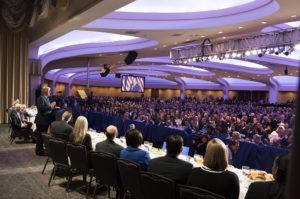The National Rubber Stamp for Theocracy Breakfast
 President Trump delivers remarks at last year's National Prayer Breakfast on February 8, 2018 (Photo by Joyce N. Boghosian)
President Trump delivers remarks at last year's National Prayer Breakfast on February 8, 2018 (Photo by Joyce N. Boghosian) As representatives from fifty US states and 140 countries gathered for the annual National Prayer Breakfast, President Donald Trump delivered an address that lacked the bluster from his previous year’s address. Unlike his first remarks before this group in 2017, Trump made no policy pronouncements favoring the religious right, such as the pledge he made last year to abolish the Johnson Amendment. Nor did he curse, hurl insults, or make lewd sexist comments.
Instead, the reality TV star displayed the robotic veneer seen whenever he actually accepts wise counsel to dial back his bravado and act presidential. Although he didn’t directly attack non-Christians, his message left the clear impression that he intends to enforce laws and policies designed to advance the United States as a “Christian” nation.
His opening comment, “America is a nation of believers and we are strengthened by the power of prayer” clearly ignores the growing trend of Americans who classify their religion as “none.” Throughout his speech, President Trump continued to stress the notion that being a faithful American citizens requires believing in God with remarks such as “each year this event reminds us that faith is central to American life and to liberty…. we place our hands on our hearts as we recite the pledge of allegiance and proclaim that we are one nation under God,” and “we praise god for how truly blessed we are to be American.”
Trump’s interpretation of religious faith has a definite Christian focus. “As the Bible tells us, for we are God’s handiwork, created in Jesus Christ, to do good works.” Trump did not address specific cases of Christians facing penalties for refusing to support civil laws granting equal rights for all people. However, he clearly spoke a religious language that will be interpreted by the religious right as an intention to continue his quest to protect their “right” to impose their religious beliefs in the public square. “When Americans are able to live by their convictions, to speak openly of their faith, and to teach children what is right, our families thrive, our communities flourish, and our nation can achieve anything at all.”
Furthermore, his retelling of a story of a nine-year old girl (Sophia) who recovered from a rare disease because God was on her side ignores the scientific reality that advances in medical care played a major factor in enabling her to walk again.
He concluded his remarks with a thinly veiled attack against the nonreligious by stressing the necessity of a belief in God in order to be truly American. “As long as we open our eyes to God’s grace, and open our hearts to God’s love, then America will forever be the land of the free, the home of the brave, and the light unto all nations.”
By comparison, President Barack Obama holds the distinction of being the first president who addressed this gathering by acknowledging the rights of nonreligious people. In his 2010 remarks, Obama proclaimed, “God’s grace, and the compassion and decency of the American people is expressed…by Americans of every faith, and no faith, uniting around a common purpose, a higher purpose.”
A press release issued by the American Humanist Association (AHA) pointed to this dichotomy between Obama’s message of inclusion and Trump’s Christianized remarks. As AHA Executive Director Roy Speckhardt observed, “Trump has taken these government endorsed prayer breakfasts to a new low, demonstrating his ignorance and disdain for the growing diversity of faiths and philosophies found in the country he’s supposed to be leading.”
On the Americans United (AU) blog, AU Communications Director Rob Boston noted, “Yes, most Americans are believers, but a growing number are not. Figures vary, but according to one recent survey, 34 percent of Americans identify as atheist, agnostic, or “nothing in particular.” As for prayer, 23 percent of Americans say they seldom or never engage in that practice.
Even if a president like Obama chose to acknowledge nonreligious US citizens at the National Prayer Breakfast, and religious leaders of other faiths are present at this event, the fact remains that this prayer breakfast has been designed from its inception to promote a politicized form of Christianity. For those unfamiliar with the history of the National Prayer Breakfast, The Family (aka The Fellowship Foundation) began hosting this event in 1953 during the Eisenhower era when Christianity became embedded as the civil religion of a post-war US of A. During this era, “In God We Trust” was added to the US paper currency, “Under God” became part of the Pledge of Allegiance, and evangelist Billy Graham led crusades against the evils of godless Communism.
Extensive reporting by religion scholar Jeff Sharlet has well documented The Family’s funding of international right wing ventures and their connections to a wide array of political figures including Vice President Mike Pence. Also, as I reported earlier at TheHumanist.com, US Education Secretary Betsy DeVos, whose appointment represented a major win for the religious right, can be connected to The Family via one of their private events titled “The Gathering.”
Family-friendly faith-based funding streams continue to support Trump as long as he remains connected to Pence and advances their agenda. Hence, anyone who deliberately refuses to speak out against the National Prayer Breakfast or individuals connected to The Fellowship Foundation implicitly supports Trump regardless of their political or religious affiliations.
